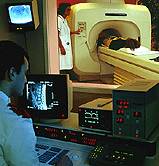
WEDNESDAY, April 6 (HealthDay News) — MRI brain scans may help predict which adults with mild cognitive impairment — early-stage memory problems that don’t interfere with daily living — are more likely to develop full-blown Alzheimer’s disease, a new study suggests.
Analyzing baseline MRI exams from the Alzheimer’s Disease Neuroimaging Initiative, a large study of healthy individuals and others with mild cognitive impairment (MCI) and early Alzheimer’s, scientists calculated that those with MCI had a one-year risk of progressing to Alzheimer’s ranging from 3 percent to 40 percent.
Typically, people with MCI will develop Alzheimer’s disease at a rate of 15 to 20 percent annually, the researchers said, which is markedly higher than the 1 to 2 percent rate of the general population.
“In the last few years we’ve seen a real explosion of biomarkers related to Alzheimer’s disease,” said lead study author Linda McEvoy, assistant professor of radiology at University of California-San Diego School of Medicine. “Our ability to detect this has improved. I wasn’t surprised by the strength of the results.”
Affecting about five million Americans, Alzheimer’s gradually robs patients of memory, language skills and judgment before rendering them incapable of caring for themselves. MCI, which does not always progress to Alzheimer’s, is more serious than normal age-related decline but does not reflect the significant deterioration of Alzheimer’s dementia.
The new study, published online April 6 and in the June print issue of the journal Radiology, showed a pattern of thinning in the brain’s cerebral cortex — the outermost layer of the cerebral hemispheres that plays a key role in memory, attention, thought and language — among patients more likely to develop Alzheimer’s. (One of the hallmarks of Alzheimer’s is a loss, or atrophy, of brain cells in certain areas of the cortex.)
The study data, gathered between 2005 and 2010, included a baseline MRI exam to serve as an initial measurement and a second MRI performed a year later on 203 healthy adults, 317 patients with MCI and 164 patients with late-onset Alzheimer’s disease. The patients’ average age was 75.
By combining the results of the two MRIs, the researchers calculated that the MCI patients’ risk of disease progression ranged from 3 percent to 69 percent, with an average group risk of 27 percent.
“The study is pretty robust,” said Bill Thies, chief medical and scientific officer of the Alzheimer’s Association. “It’s an area of great activity and interest at the moment. This paper is a really good attempt to sort out biomarker information.”
But experts pointed out that an enhanced ability to predict who will develop Alzheimer’s is not accompanied by the ability to forestall its terrible prognosis. While several drugs can temporarily improve thinking skills in some early-to mid-stage Alzheimer’s patients, no treatments exist that prevent or cure the condition.
“We’re looking at changes in a disease that has a long asymptomatic period … that probably goes on for a couple of decades before showing symptoms. We probably do want to go to a point where we can pick out people before symptoms show, but we have nothing to treat them [with],” said Dr. Raj C. Shah, medical director of the Rush Memory Clinic in Chicago. “It’s a little bit of chicken and egg, but we have to start somewhere — and an advance in one area helps advance another.”
McEvoy and Thies said early detection could help patients in other ways, however. Some may gain access to cutting-edge clinical drug trials, while the information could offer patients and their families time to plan for future needs, such as caregiving.
Even those untouched by Alzheimer’s disease stand to benefit from this type of research, Thies noted.
The incidence of Alzheimer’s disease “is going to get acutely worse in the next four years and will bankrupt the health care system,” he said. “So this kind of work is critically important to everyone. Because of the cost and increase in frequency, it’s going to be a major driver of health care costs.”
Although McEvoy said she doesn’t think “there are big barriers to be able to use this clinically,” she and the other experts agreed more research is needed before MRIs for Alzheimer’s diagnosis become commonplace.
“At some point we will be able to tell people about their risk before they have any symptoms, and in a perfect world we could treat symptoms before they emerge,” Thies said. “Just like we treat high blood pressure to avoid heart attack and stroke, clearly this is a model we’re going to see emerge.”
More information
The Alzheimer’s Association has more information about symptoms.

